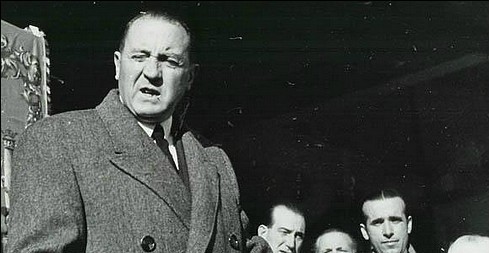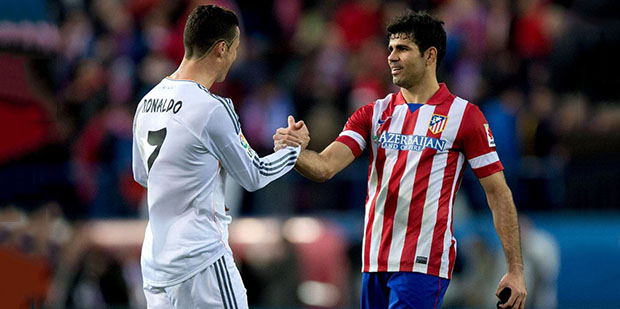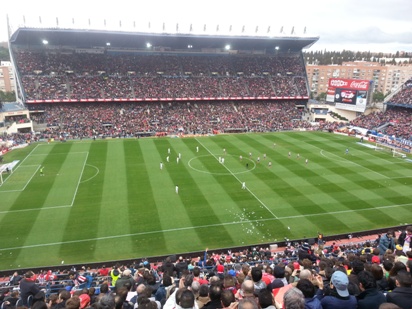BERNABÉU, FRANCO AND REAL MADRID – The truth behind the club and the dictatorship
-
Updated: 6 March, 2012

Santiago Bernabéu has frequently been linked to the Franco dictatorship that governed Spain for almost 40 years during the previous century, so much so that some critics have attempted to discredit Real Madrid’s successes during the 1950’s and 60’s with the accusation.
How many of these claims are true and how many are myths built up over time?
Franco and Santiago Bernabéu were in power (one in charge of an entire country, the other in charge of just a football club) for virtually the same amount of time and both passed away in the late 1970’s, both ruled with an iron-fist.
So there are similarities between the two and it is easy to play with these and come to conclusions. But was Bernabéu a man of the regime? There are undisputed facts that will lead people to say he was. For instance, his experiences during The Spanish Civil War.
In republican Madrid (as it was in 1936) Bernabéu was hunted down and arrested for being a member of Gil Robles CEDA (an ultra right-wing political party). When Bernabéu managed to escape Madrid, he quickly joined Franco’s army, becoming a captain in the 150th Moroccan Division.
His unit took part in the assault on Catalonia and he was decorated with one of the highest military medals for the role he played in the taking of Bielsa, an important strategic town in The Pyrenees.
Bernabéu was a right-winger, of this there is no doubt, he is what was known in Spain as “un hombre de orden” (a man of order) and, with Franco he shared an intense dislike for both Catalan and Basque nationalists.
Bernabéu was fond of telling stories about his experiences during the war and in one he spoke of the moment his division entered the Catalan town of Lleida: “The old people in the town were looking at us crying with hate and when old people cry because of such hatred, there is no future for a people.”
However despite these instances, Bernabéu also had confrontations with high-ranking officials in Franco’s regime, one being the fearsome founder of the Spanish Foreign Legion, General Millán Astray.
Astray had become a fan of football in the 1940’s and liked to go and watch Real Madrid play in Chamartin.
He was always accompanied by a legionnaire and without being invited, he would always enter the stadium through the main entrance and take a seat in the presidential box.
Bernabéu tolerated this, although he disliked Astray abusing his power to treat the box as if it was his own, especially when he was inviting his cronies to join him in it. However one afternoon Astray’s behaviour crossed the line.
Astray despite being terribly disfigured in conflict was a well-known ladies-man, grabbed a good looking woman and tried to kiss her. The woman happened to be the wife of a diplomat who didn’t take kindly to this and words were exchanged. Were it not for the intervention of Bernabéu, who knows what would have happened, given Astray’s legendary violent temperament.
The whole episode was the excuse Bernabéu was looking for and he subsequently closed the VIP zone to everyone, except for those he had personally invited.
At the following game, Astray went along as usual and was surprised to see that he wasn’t allowed to enter into the VIP area. Furious, he called on two of his legionnaires and with force they made there way into the area. When Bernabéu arrived, Astray demanded an explanation as to why he was denied access, Bernabéu wasn’t prepared to give him one.
Raging with anger, Astray invited Bernabéu to a ‘pistol duel’ and fired his weapon in anger, before being escorted away. Bernabéu reported this incident to General Moscardó, who was the head of sporting matters in the regime. Moscardó ordered Bernabéu to explain himself to Astray and to apologize.
Bernabéu refused and went above Moscardó’s head to General Muñoz Grandes, a high ranking military official and a personal friend since both were in the 150th Division together.
Muñoz Grandes had this to say to his friend: “Don’t you worry Santiago, already this has nothing to do with you, I will personally sort it out and in the future you send Astray to any part of the stadium you want.” Millán Astray was disciplined for his behaviour and never went to see Real Madrid play again.
Bernabéu possessed a strong personality and was to upset the regime on a number of further occasions. One high profile incident occurred when he invited the exiled Spanish Royal family to a European Cup match when Real Madrid were playing in Switzerland.
On another ocassion he gave the club’s special gold insignia to Moshe Dayan (an Israeli military commander and politician) – this at a time when Israel was not recognised as being a country by Franco’s regime.
Bernabéu had very few meetings with Franco and most of those he did have, were of an official nature. The dictator normally invited the team to his palace following a trophy success, as he attempted to share in the glory.
In summary, it is true that Bernabéu shared similar ideological values with Franco, but when you take into consideration some of the events in this article, was he really a man of the regime?
I will leave it for you to decide…






9 Comments
You must be logged in to post a comment Login